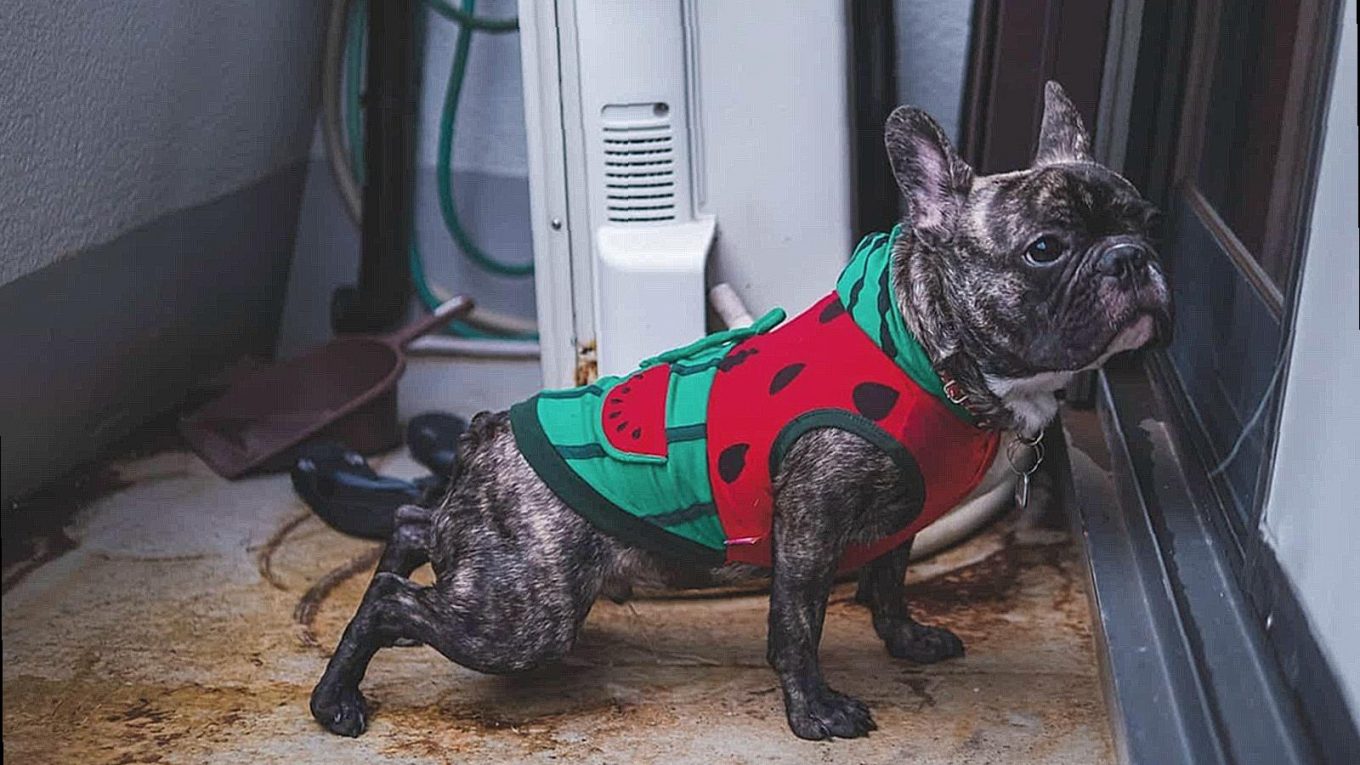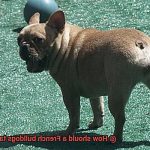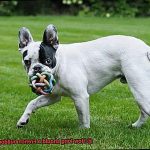How long does it take to potty train Frenchie?
Get ready to dive headfirst into the wild world of potty training these adorable French Bulldogs. We all want to know: “How long does it take to potty train a Frenchie?” Well, hold on tight because we’re about to embark on an epic journey through the ins and outs of Frenchie potty training.
Potty training a French Bulldog requires patience, consistency, and a little bit of doggie psychology. These lively pups are known for their playful nature and stubborn streak, which can make the training process both exciting and challenging. But fear not. With the right approach, most Frenchies can be fully potty trained within three to six months.
So, what’s the secret sauce for success? It’s all about establishing a routine, learning your Frenchie’s bathroom cues, and using positive reinforcement techniques. We’ll dig deep into these strategies and even share some insider tips that will turbocharge your Frenchie’s progress.
But wait. The road to a potty-trained Frenchie isn’t always smooth sailing. We’ll also tackle the potential challenges that might test your patience along the way. From those pesky accidents to unexpected setbacks, we’ve got you covered with expert advice on how to overcome any obstacle that comes your way.
Whether you’re a newbie owner in need of guidance or a seasoned pro looking for a refresher course, join us on this potty training adventure. Together, we’ll unravel the mysteries, conquer the challenges, and witness your fur baby transform into a well-behaved, potty-trained companion. So buckle up and let’s get started.
Factors Affecting the Duration of Potty Training a Frenchie
Contents
- 1 Factors Affecting the Duration of Potty Training a Frenchie
- 2 Average Time to Potty Train a Frenchie
- 3 Establishing a Routine for Successful Potty Training
- 4 Positive Reinforcement During the Process
- 5 Patience and Understanding are Essential
- 6 Crate Training as an Effective Tool for Potty Training
- 7 Consistency is Key for Successful Potty Training
- 8 Monitoring Your Frenchie During the Process
- 9 Conclusion
Potty training is a crucial aspect of owning a French Bulldog. While it can be a challenging process, understanding the factors that affect the duration of potty training can lead to a more efficient and successful experience. In this article, we will explore these factors and provide tips for effective potty training.
Breed Characteristics:
French Bulldogs possess unique breed characteristics that can influence the duration of potty training. Some Frenchies are naturally clean and have a strong instinct to eliminate away from their living spaces, expediting the training process. However, others may be more stubborn and require additional time and patience to grasp the concept.
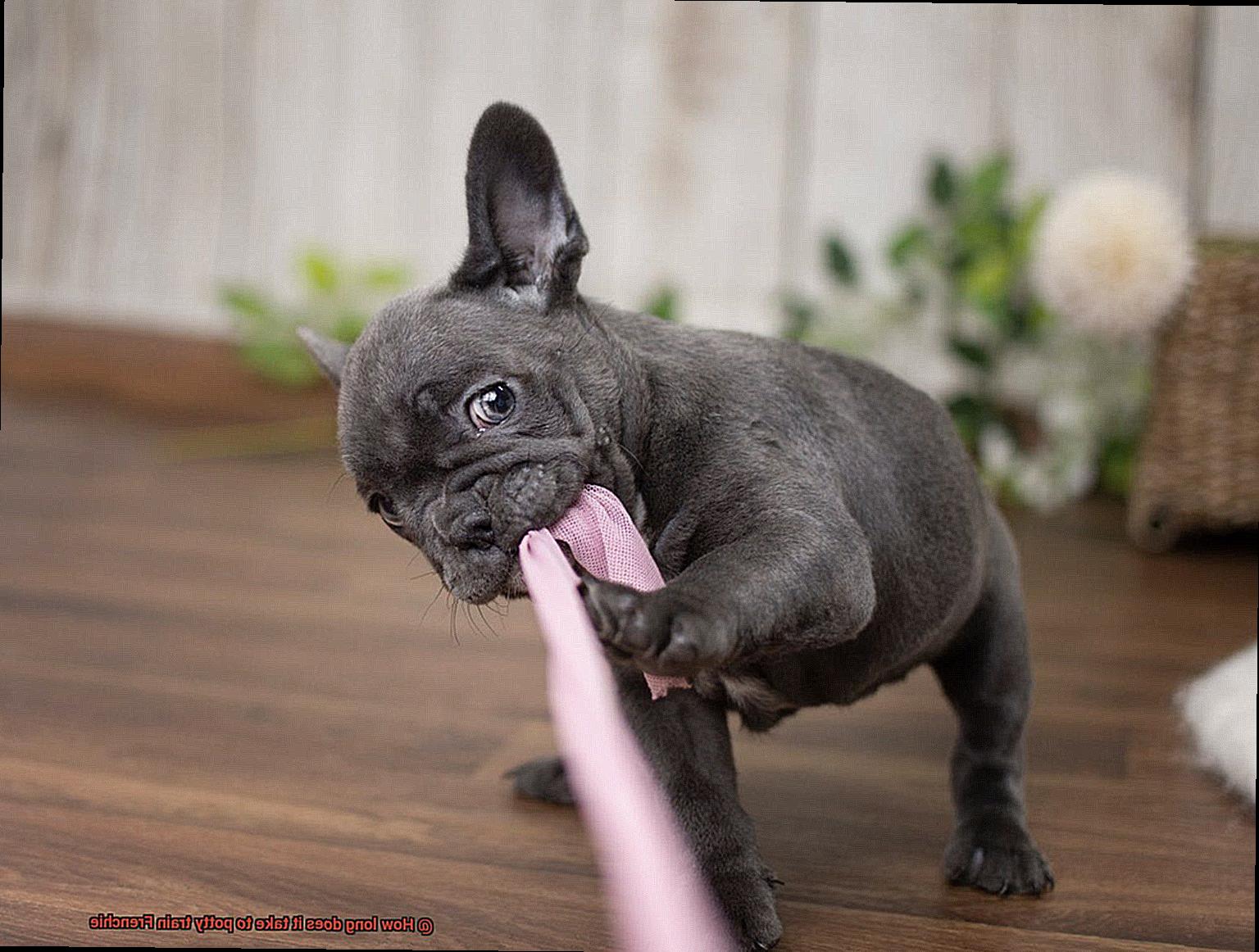
Age:
Starting potty training at an early age is crucial for success. Younger puppies, typically between 8 and 12 weeks old, have a faster learning curve and adapt more readily to new routines and habits. If you adopt an older Frenchie or begin training late, it may take longer to unlearn existing habits and establish new ones.
Consistency and Routine:
Consistency is key in potty training any dog, including French Bulldogs. Establishing a regular routine for feeding, exercise, and bathroom breaks is essential. Take your Frenchie outside at consistent intervals throughout the day and reward them when they eliminate in the designated potty area. This reinforces the desired behavior and facilitates learning.
Training Method:
The approach you take in potty training your Frenchie can impact the duration of the process. Positive reinforcement methods, such as treats or praise when they eliminate in the right place, tend to be more effective than punishment-based methods. Patience, consistency, and positive reinforcement are key components of successful potty training.
Individual Personality and Temperament:
Each Frenchie has its own personality and temperament, which can affect the duration of potty training. Understanding your Frenchie’s personality and adapting your training methods accordingly can expedite the process. Some may be eager to please and quick to learn, while others may be more independent or stubborn.
Owner Dedication and Time Investment:
Potty training requires a significant time investment from the owner. It is essential to dedicate time to supervise and guide your Frenchie during the training process. Consistency, patience, and positive reinforcement demand ongoing effort. The more time and effort you invest, the quicker your Frenchie is likely to grasp the concept.
Conclusion:
Average Time to Potty Train a Frenchie
Embarking on the adventure of potty training a French Bulldog may seem daunting, but fear not. With patience, consistency, and understanding, you’ll soon have your furry friend confidently strutting to the potty. So, how long does it really take to potty train a Frenchie? Let’s explore the details.
Factors That Influence Training Duration:
Before setting expectations, it’s important to recognize that each Frenchie is unique, just like humans. They have their own learning pace. However, on average, it takes a few weeks to a few months for a Frenchie to become a potty training pro.
Age Matters:
Puppies, those adorable bundles of energy, may take longer to grasp potty training compared to adult dogs. Their attention span is shorter, requiring more time and repetition to understand expectations. Patience is key during this process as accidents are bound to happen along the way.
Consistency is Key:
To successfully potty train your Frenchie, consistency becomes your best friend. Establishing a routine helps your furry friend understand when and where they should go potty. Take them outside first thing in the morning, after meals, and before bedtime. Praise and reward them for doing their business in the designated spot – positive reinforcement works wonders.
Close Supervision:
During the potty training phase, keep an eagle eye on your Frenchie indoors. Look for signs like sniffing or circling that indicate they need to go outside. If you catch them in the act of having an accident indoors, calmly interrupt them and rush them outside immediately. Remember, scolding or punishing them will only confuse and hinder their progress.
The Magic of Crate Training:
Crate training can be a game-changer when potty training your Frenchie. Dogs instinctively keep their sleeping area clean, so using a crate teaches them to hold their bladder or bowels. Ensure the crate is the right size – allowing them to stand up, turn around, and lie down comfortably. Take them outside to do their business before placing them in the crate, and don’t forget to shower them with praise when they succeed.
Expect Setbacks:
Accidents happen, even with the most diligent potty trainers. Don’t get discouraged. Instead, focus on reinforcing positive behaviors and providing ample opportunities for your Frenchie to go potty in the appropriate spot. Remember, patience is key.
Establishing a Routine for Successful Potty Training
Potty training your French Bulldog may seem like a daunting task, but fear not. By implementing consistency, positive reinforcement, and a healthy dose of patience, you can conquer this challenge. Here’s how to establish a routine that will work wonders for your Frenchie:
Consistency is key:
- Stick to a regular bathroom schedule. Take your Frenchie outside to their designated potty area first thing in the morning, after meals, playtime, and before bed.
- Designate one door for potty time. This helps your Frenchie associate that door with the call of nature.
- Use the same verbal cue every time. Whether it’s “Go potty” or “Do your business,” be consistent to help your Frenchie understand what’s expected.
Positive reinforcement:
- Shower your Frenchie with praise and rewards when they successfully go potty outside. Treats, verbal kudos, and gentle pets will let them know they’ve aced it.
- Avoid scolding or punishing accidents indoors. Instead, calmly clean up the mess and emphasize the importance of going outside.
Patience is key:
- Remember that each dog learns at their own pace. Some grasp the concept swiftly, while others take more time.
- Be patient with accidents and setbacks. Mishaps are part of the learning process.
- Gradually increase the time between bathroom breaks as your Frenchie becomes more reliable in holding their bladder.
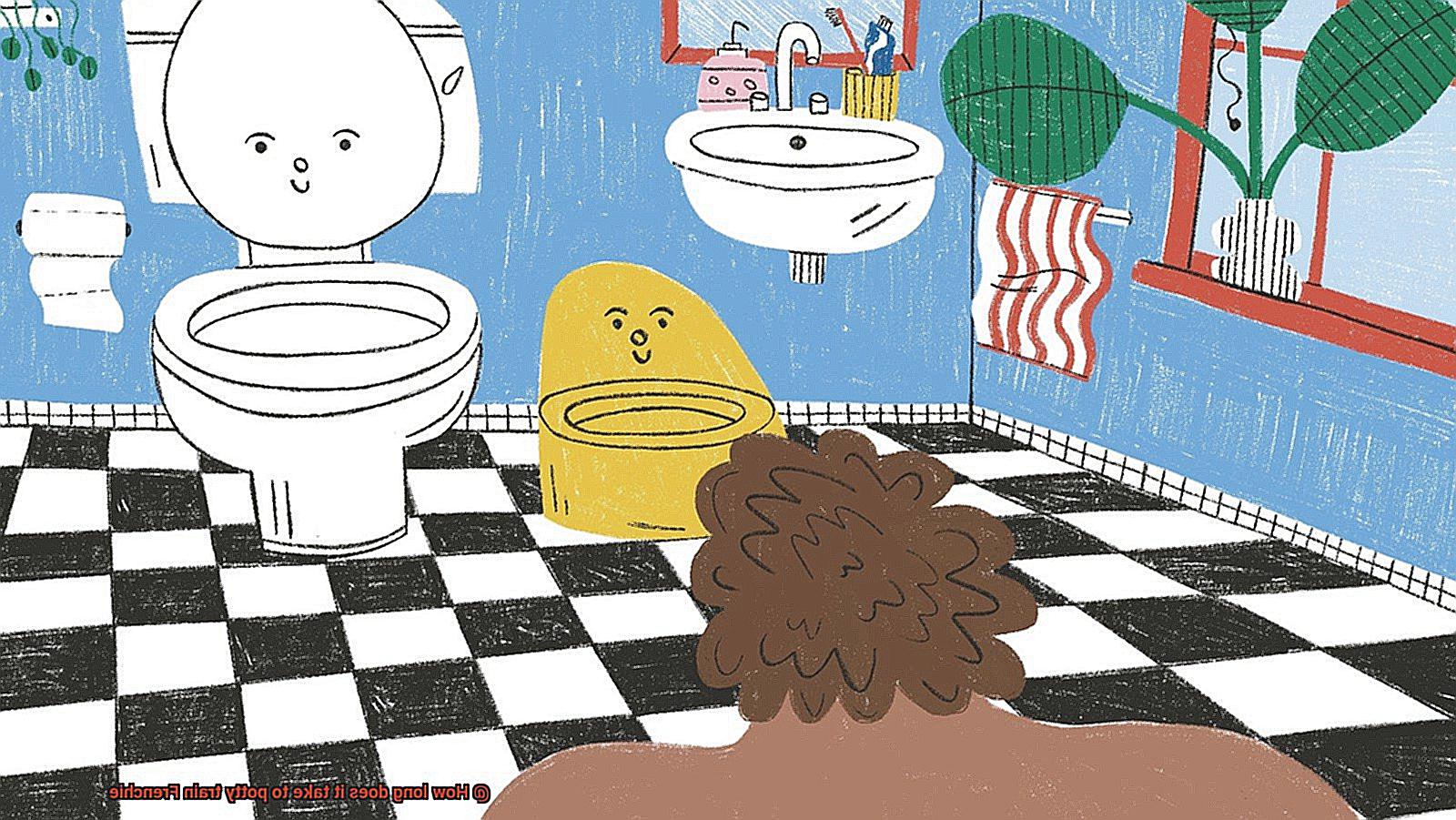
Time investment:
- Prepare to invest several weeks or even months into potty training. It takes time and effort to achieve success.
- Celebrate small victories along the way while maintaining realistic expectations.
Positive Reinforcement During the Process
Embarking on the potty training journey with your French Bulldog may seem like a daunting task. However, by embracing the power of positive reinforcement, you can transform this process into a smooth and enjoyable experience for both you and your furry companion. In this article, we will delve into the concept of positive reinforcement during the potty training process and provide valuable insights on its implementation.
Consistency is Key:
Consistency forms the bedrock of effective potty training for your Frenchie. By steadfastly employing positive reinforcement techniques, you establish clear expectations and reinforce desired behaviors. Ensure that everyone in your household is committed to using positive reinforcement consistently. This involves synchronizing rewards, employing consistent verbal cues, and providing the same type of reward each time.
Timing is Everything:
The timing of rewards plays a pivotal role in potty training success. Instantly rewarding your Frenchie when they eliminate in the designated area helps solidify the connection between the behavior and the reward. This immediate reinforcement strengthens their understanding that eliminating in the appropriate spot leads to positive outcomes.
The Power of Rewards:
Choosing highly motivating rewards is crucial for effective positive reinforcement during potty training. Opt for treats, verbal praise, or their beloved toy as rewards. Select rewards that hold significant value for your Frenchie and will drive them to work towards success. Verbal praise also wields immense influence in positive reinforcement. Utilize an exuberant and enthusiastic tone to shower your Frenchie with praise whenever they successfully eliminate in the desired area.
Avoid Punishment:
Steering clear of punishment or negative reinforcement is essential during potty training endeavors. Penalizing your Frenchie for accidents or mistakes instills fear and anxiety, impeding their progress. Instead, focus on positively reinforcing desired behaviors and redirecting them when accidents occur.
Patience is Key:
Every Frenchie possesses their unique pace in potty training. Cultivating patience and empathy throughout the process is vital. Consistently employing positive reinforcement techniques will enable your Frenchie to grasp the concept of eliminating in the appropriate location and foster good potty habits.
Patience and Understanding are Essential
In life, the road to success is often lined with obstacles and challenges. It is during these times that the qualities of patience and understanding become vital. With their ability to provide a steady foundation and a compassionate perspective, these qualities can help individuals navigate difficult situations, build stronger relationships, and achieve personal growth. This article will explore why patience and understanding are essential qualities for success in life, highlighting their benefits and offering practical strategies for cultivating them.
Patience: A Virtue that Leads to Success
Patience is the ability to remain calm and composed in the face of adversity or delay. It allows individuals to maintain a long-term focus, persevere through setbacks, and make well-thought-out decisions. By practicing patience, one can avoid impulsive actions driven by frustration or instant gratification. Instead, they can approach challenges with a clear mind and a strategic mindset.
Understanding: Building Bridges and Strengthening Connections
Understanding is the capacity to empathize with others, acknowledging their perspectives and experiences. It fosters open communication, promotes harmony, and strengthens relationships. When individuals seek to understand others’ viewpoints, they can find common ground, resolve conflicts peacefully, and build trust. Understanding also encourages tolerance and respect for diversity, creating a more inclusive and accepting society.
Emotional Intelligence: The Bridge between Patience and Understanding
Emotional intelligence encompasses self-awareness, self-regulation, empathy, and social skills. It plays a crucial role in developing both patience and understanding. By cultivating emotional intelligence, individuals can better manage their own emotions, regulate their responses to challenging situations, and empathize with others’ feelings. This leads to improved communication, enhanced problem-solving abilities, and more productive collaborations.
Practical Strategies for Cultivating Patience and Understanding:
- Practice mindfulness meditation to develop self-awareness and emotional regulation.
- Seek out diverse perspectives through reading, engaging in conversations, or participating in cultural activities.
- Practice active listening to truly understand others’ viewpoints without judgment or interruption.
- Engage in self-reflection to identify personal triggers and develop strategies for managing impatience or bias.
- Cultivate empathy by putting yourself in others’ shoes and considering their circumstances and emotions.
- Practice gratitude to foster a positive mindset and reduce frustration or negativity.
Crate Training as an Effective Tool for Potty Training
I’m about to let you in on a little secret weapon that can make this process a breeze: crate training. In this article, we’ll explore how crate training can be your ultimate ally in potty training your furry friend, with a special focus on our beloved Frenchies. So, grab a cup of coffee and let’s embark on this journey together.
Creating the Perfect Den:
French Bulldogs are notorious for their love of comfort and coziness, making them ideal candidates for crate training. By providing them with a crate or small confined space, you’re tapping into their innate desire for a den-like environment. After all, dogs don’t fancy eliminating where they eat and sleep – it’s simply not their style.
Size Matters:
Before you rush out to purchase the largest crate available, hold your horses. It’s crucial to select the right-sized crate for your Frenchie. You want it to be spacious enough for them to stand up, turn around, and lie down comfortably, while also ensuring it’s not so roomy that they can designate one end as their personal restroom. Remember, we’re aiming for a snug den here.
Introducing the Crate:
Think of crate training as a gradual process – just like learning to swim before diving into the deep end. Begin by creating an inviting space inside the crate. Fill it with enticing treats, stimulating toys, and plush bedding to entice your Frenchie to explore. Let them associate the crate with positive experiences and delightful surprises.
Feeding Time Fun:
French Bulldogs have an insatiable appetite (who can blame them?), so why not leverage that to our advantage? Use mealtime as an opportunity to reinforce the notion that the crate is their personal sanctuary. By feeding your Frenchie inside the crate, you’re forging a positive association with this space and strengthening their bond with it.
Consistency is Key:
Ah, the golden rule of potty training – consistency. Make it a habit to take your Frenchie outside immediately after releasing them from the crate at regular intervals. This includes after waking up, after meals, and after playtime. The more consistent you are, the faster your Frenchie will grasp the concept of potty training, leading to success in record time.
Patience, Patience, Patience:
Accidents are bound to happen – it’s an inevitable part of the potty training process. But remember, patience is paramount here. Instead of scolding or punishing your Frenchie for mishaps, focus on reinforcing positive behaviors by rewarding them when they eliminate in the designated outdoor area. Positive reinforcement always trumps punishment, fostering a trusting and loving relationship.
Consistency is Key for Successful Potty Training
Potty training can be a challenging task, but with consistency, patience, and the right techniques, you can successfully train your Frenchie to do their business where they’re supposed to. In this article, we’ll explore why consistency is crucial for potty training your French Bulldog and provide practical tips to make the process smoother.
Why Consistency Matters:
Establishing a Routine:
French Bulldogs thrive on routine, just like any other dog. By setting a regular schedule for feeding and bathroom breaks, you’ll help your Frenchie understand what is expected of them and reinforce good bathroom habits. Consistency in timing and location will create a sense of familiarity and predictability for your Frenchie.
Positive Reinforcement:
Consistency in using positive reinforcement techniques is essential for teaching your Frenchie that going potty outside is a desirable behavior. Praise them enthusiastically, give them tasty treats, or use a clicker to mark the behavior you want to reinforce. This consistent positive feedback will help your Frenchie understand that they are doing the right thing.
Avoiding Punishment:
Punishing or scolding your Frenchie when they have an accident indoors can create fear and anxiety around eliminating. Instead of punishment, clean up accidents calmly and thoroughly using an enzymatic cleaner to remove any lingering scent. Focus on rewarding your Frenchie for going potty outside with treats, praise, and affection.
Practical Tips for Consistent Potty Training:
Set a Schedule:
Take your Frenchie outside shortly after they eat, drink, wake up from a nap, or play. These activities often trigger the need to eliminate. By consistently taking them outside during these times, you’ll help them associate the outdoors with potty time. Remember to use the same designated spot in your yard each time.
Use a Cue Word:
Choose a specific word or phrase like “go potty” and use it consistently when taking your Frenchie outside. This cue word will help them understand what is expected of them when they hear it. Over time, they will associate the cue with the action of eliminating.
Supervise Closely:
Keep a close eye on your Frenchie when they are indoors, especially during the initial stages of potty training. Look out for signs that they need to go, such as sniffing or circling. When you notice these signs, quickly take them outside to their designated potty area. Consistent supervision will prevent accidents and reinforce the idea of going outside to eliminate.
Monitoring Your Frenchie During the Process
Now, let’s tackle the exciting challenge of potty training. Fear not, my fellow Frenchie enthusiasts. With patience and vigilant monitoring, you can navigate this process like a pro.
First and foremost, supervision is key. During the early stages of potty training, keep a watchful eye on your Frenchie at all times. No bathroom breaks without your eagle-eyed presence. Consider using baby gates or closing off rooms to limit their access until they’ve mastered the art of pottying in the right place.
Establishing a routine is crucial. Frenchies thrive on consistency, so set a regular schedule for feeding, playtime, and bathroom breaks. Take your pup outside to their designated potty spot at regular intervals throughout the day. Morning? Check. After meals? Check. Before bedtime? You betcha. Consistency is key.
Now, let’s talk about those telltale signs that your Frenchie needs to go potty. Keep an eye out for sniffing, circling, or squatting behavior. If you notice any of these signs, whisk your pup outside to their designated spot pronto. And remember, positive reinforcement is your secret weapon. When your Frenchie successfully does their business outside, shower them with praise and rewards like treats or verbal affirmations. They’ll soon associate going potty in the right place with happy moments.
Accidents happen, even to diligent pup parents. When they occur (and they will), it’s essential to clean them up properly using an enzymatic cleaner designed specifically for pet stains and odors. Say goodbye to ammonia-based cleaners as they can attract your Frenchie back to the scene of the crime.
Keeping a journal may seem over-the-top, but trust me, it’s helpful. By recording your Frenchie’s potty habits, you can identify patterns and make adjustments to your training routine if needed. Plus, it adds a touch of organization to an otherwise chaotic process.
Remember, my dear Frenchie aficionados, patience is key. Potty training takes time and consistent effort. Accidents are not failures but opportunities for growth and learning. Stay calm, stay consistent, and keep reinforcing those positive behaviors. Soon enough, your Frenchie will be a potty-trained superstar.
Kba9bR0evdw” >
Conclusion
Potty training a Frenchie can be a challenging task, but with patience and consistency, you can achieve success. The time it takes to potty train a Frenchie can vary depending on various factors such as the dog’s age, temperament, and previous training experiences. On average, it can take anywhere from a few weeks to a few months to fully potty train a Frenchie.
During the potty training process, it is important to establish a routine and stick to it. Take your Frenchie outside frequently, especially after meals or naps, and reward them with praise or treats when they eliminate in the designated potty area. Consistency is key in reinforcing good behavior and helping your Frenchie understand where they should do their business.
It’s essential to keep in mind that accidents will happen during the potty training phase. Instead of getting frustrated or scolding your Frenchie for accidents, remain calm and redirect them to the appropriate spot. Punishing or yelling at your dog will only confuse them and hinder their progress.
Using positive reinforcement techniques like treats, praise, and consistent rewards will help motivate your Frenchie to learn faster. Additionally, crate training can be an effective tool during the potty training process as dogs generally do not like soiling their sleeping areas.
Remember that every dog is unique, and some may catch on quickly while others may take more time. Be patient with your Frenchie and celebrate small successes along the way. With perseverance and dedication, you’ll soon have a fully potty trained Frenchie who knows exactly where to go when nature calls.
